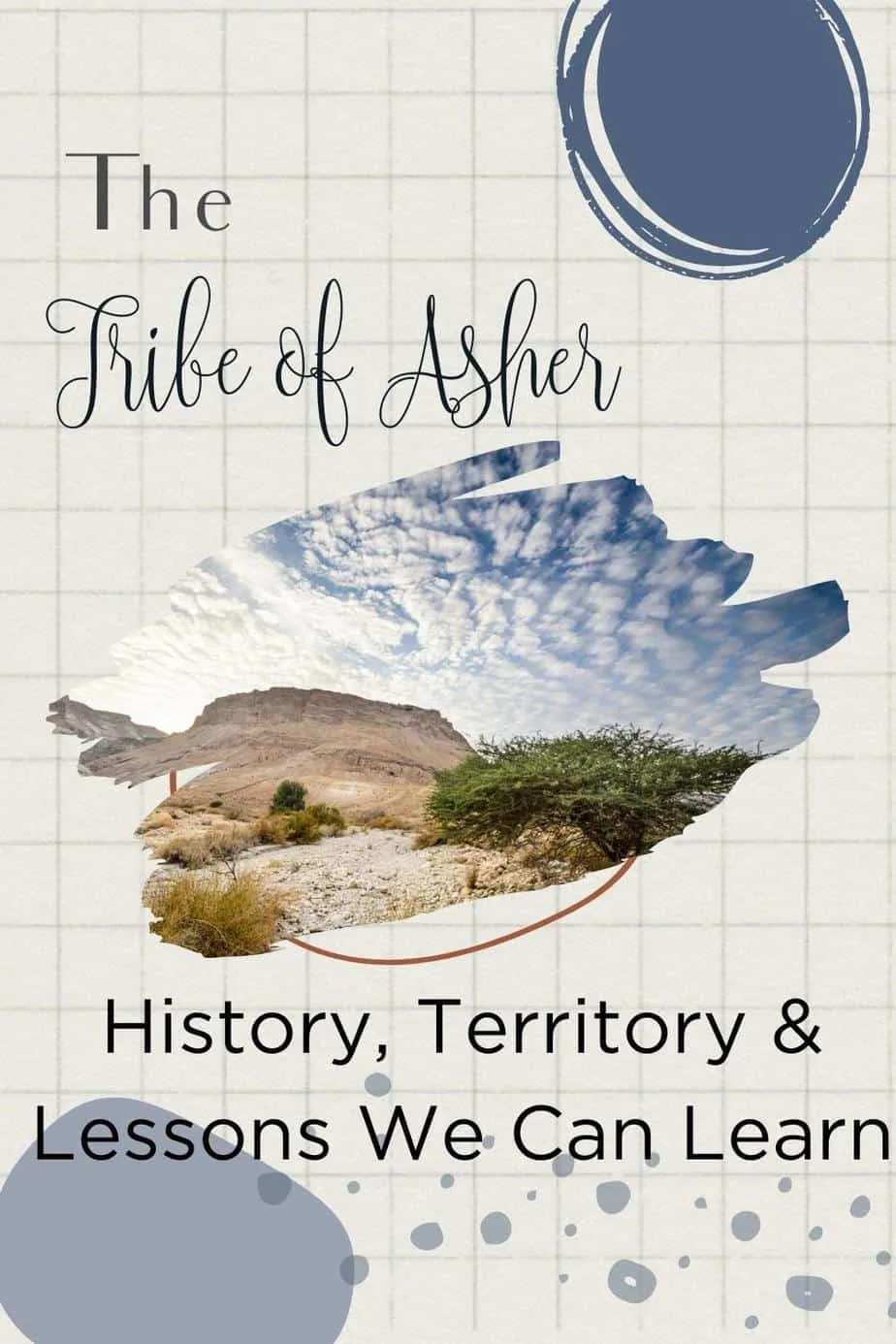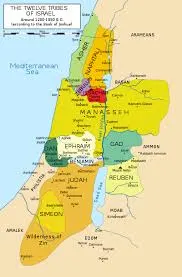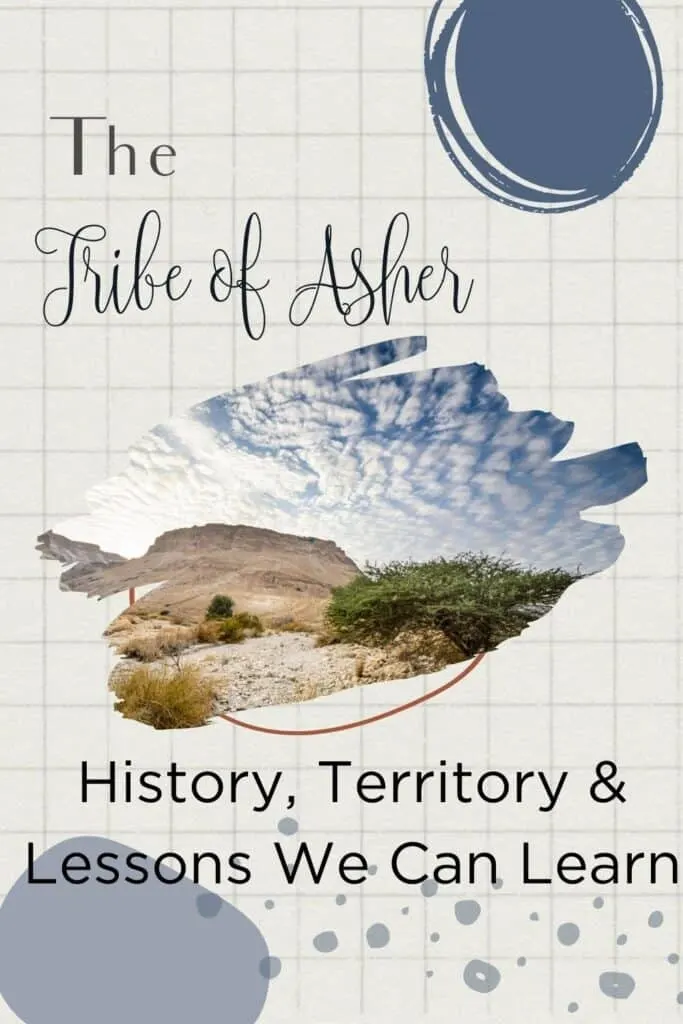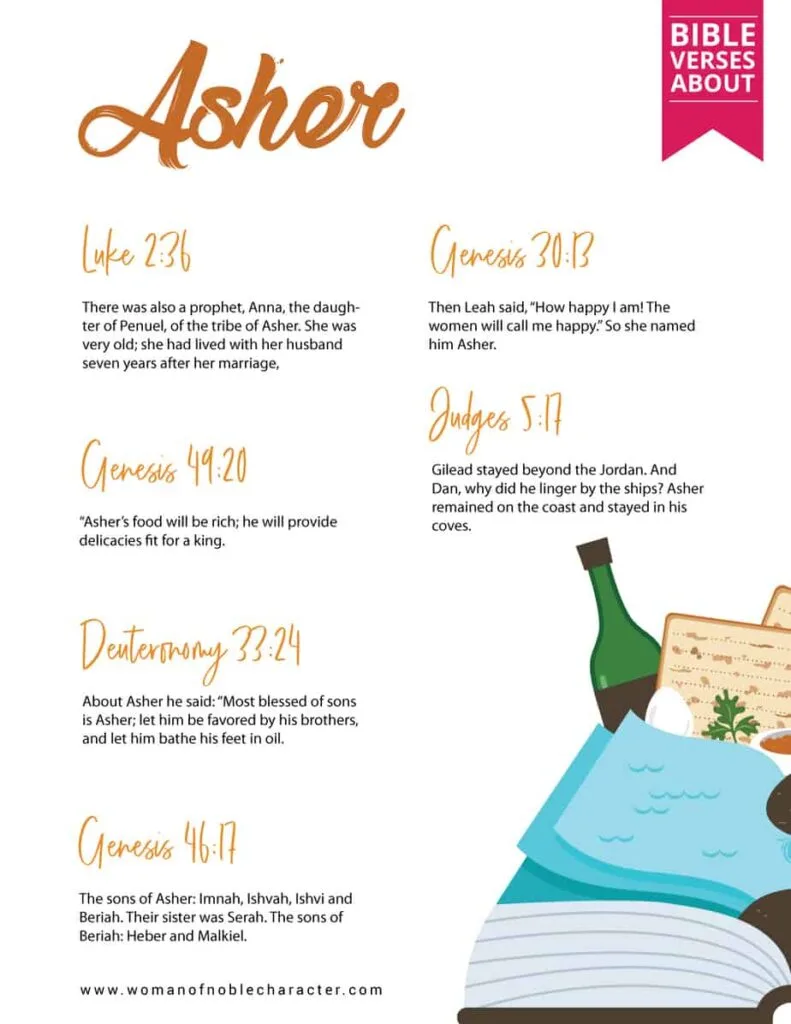This page/post may contain affiliate links. As an Amazon Associate, as well as an affiliate of other programs, this means if you purchase something using these links, I will receive a commission on qualifying purchases at no cost to you! For more detailed information, please visit our Affiliate Disclaimer page
Continuing our series on the Twelve Tribes of Israel, next we turn our attention to Asher.
(You can find posts on the previous tribes here: Reuben, Simeon, Levi, Judah, Dan, Napthali, and Gad)
Asher and the Tribe of Asher in the Bible
Asher was the eighth son; His mother was Zilpah, the maidservant of Leah and the full brother of Gad.
He was her second and last child with Jacob. When Asher was born, Leah said, “How happy am I! The women will call me happy”
And Leah said, “Happy am I! For women have called me happy.” So she called his name Asher.
– Genesis 30:13 (ESV)

Asher’s name is said to mean “happy, contentment, richness, affirmation.” (Hebrew: אָשֵׁר) The daughters of the Tribe of Asher had a good reputation and were sought after as wives by the Priests and Kings of Israel. (More on Asher’s daughter’s below).
Some biblical scholars opined that Asher liked luxury and good living even if it involved a good degree of waste. Asher is easy-going and agreeable, but his warriors were considered one of the pride or “jewels” of Israel.
Despite his affable temperament, Asher was not very certain of himself and tended to seek the affirmation of others. He was said to be honest and “upright.” He goes out of his way to obtain legal and communal affirmation for his actions. Asher needs to be re-assured. He was a follower, rather than one to initiate.
Asher was one of six tribes chosen to stand on Mount Ebal and pronounce curses.
And these shall stand on Mount Ebal for the curse: Reuben, Gad, Asher, Zebulun, Dan, and Naphtali.-
Deuteronomy 27:13 (ESV)
Through these curses, the people of Israel promised God they would avoid poor behavior and treat others right.
Here is the scripture containing the list of all twelve “curses” or admonishments delivered by Asher.
“‘Cursed be the man who makes a carved or cast metal image, an abomination to the Lord, a thing made by the hands of a craftsman, and sets it up in secret.’ And all the people shall answer and say, ‘Amen.’
Deuteronomy 27:15-26 (ESV)
“‘Cursed be anyone who dishonors his father or his mother.’ And all the people shall say, ‘Amen.’
“‘Cursed be anyone who moves his neighbor’s landmark.’ And all the people shall say, ‘Amen.’
“‘Cursed be anyone who misleads a blind man on the road.’ And all the people shall say, ‘Amen.’
“‘Cursed be anyone who perverts the justice due to the sojourner, the fatherless, and the widow.’ And all the people shall say, ‘Amen.’
“‘Cursed be anyone who lies with his father’s wife, because he has uncovered his father’s nakedness.’ And all the people shall say, ‘Amen.’
“‘Cursed be anyone who lies with any kind of animal.’ And all the people shall say, ‘Amen.’
“‘Cursed be anyone who lies with his sister, whether the daughter of his father or the daughter of his mother.’ And all the people shall say, ‘Amen.’
“‘Cursed be anyone who lies with his mother-in-law.’ And all the people shall say, ‘Amen.’
“‘Cursed be anyone who strikes down his neighbor in secret.’ And all the people shall say, ‘Amen.’
“‘Cursed be anyone who takes a bribe to shed innocent blood.’ And all the people shall say, ‘Amen.’
“‘Cursed be anyone who does not confirm the words of this law by doing them.’ And all the people shall say, ‘Amen.’

Jacob’s Deathbed Blessing to Asher
As he did with all of his twelve sons, Jacob gave a blessing before his passing to Asher:
“Asher’s food shall be rich,
Genesis 49:20 (ESV)
and he shall yield royal delicacies.
I believe (as do many biblical scholars) that this infers that Asher was, and would continue to be, a wealthy man. Jacob’s reference to Asher’s food being “rich” indicated that Asher would possess fertile lands. In Joshua 19:24-31, we learn that Asher received fertile land along the Mediterranean coast. (see below for the territory of the tribe of Asher)
Moses Blessing to Asher
Moses’ blessing to the Tribe of Asher similarly spoke of wealth and good fortune:
And of Asher he said,“Most blessed of sons be Asher;
– Deuteronomy 33:24-25 (ESV)
let him be the favorite of his brothers,
and let him dip his foot in oil.
Your bars shall be iron and bronze,
and as your days, so shall your strength be.
We know, from many recounts in the Bible, that the washing of one’s feet was a sign of prosperity and hospitality.
Blessings, but…..
Despite all its blessings, the tribe of Asher failed to drive out the Canaanites, and “because of this the people of Asher lived among the Canaanite inhabitants of the land” (Judges 1:31-32).
In the time of Deborah and Barak,
Gilead stayed beyond the Jordan;
Judges 5:17 (ESV)
and Dan, why did he stay with the ships?
Asher sat still at the coast of the sea,
staying by his landings.

He did not join the fight against Jabin, a Canaanite king. I feel this points to how Asher was not as much of a doer and more of a follower.
The Tribe of Asher’s failure to help their fellow tribes could indicate a lack of reliance on God, a lack of effort, a fear of the enemy, or a reluctance to upset those with whom they did business. Thus, the example set here is a negative one: although Asher was richly blessed, they did not behave admirably, at all times, and when the time for action came, he failed to trust in God and honor His plan.
Later in Judges, Asher does respond to Gideon’s call to repel the Midianites, Amalekites, and others from the East.
And he sent messengers throughout all Manasseh, and they too were called out to follow him. And he sent messengers to Asher, Zebulun, and Naphtali, and they went up to meet them.
Judges 6:35 (ESV)
Later, Asher accepts Hezekiah’s invitation to the tribes from the Northern Kingdom to join the Passover celebration in Jerusalem. This was considered an act of humility, proof of a contrite heart before God. So, Asher does have his moments of a humble heart for God.
It’s a fairly long passage, but I think it’s important to read to understand how the tribes came together and humbled their hearts for the Lord.
Hezekiah sent to all Israel and Judah, and wrote letters also to Ephraim and Manasseh, that they should come to the house of the Lord at Jerusalem to keep the Passover to the Lord, the God of Israel. For the king and his princes and all the assembly in Jerusalem had taken counsel to keep the Passover in the second month—
2 Chronicles 30:1-12 (ESV) (bold, mine)
for they could not keep it at that time because the priests had not consecrated themselves in sufficient number, nor had the people assembled in Jerusalem— and the plan seemed right to the king and all the assembly. So they decreed to make a proclamation throughout all Israel, from Beersheba to Dan, that the people should come and keep the Passover to the Lord, the God of Israel, at Jerusalem, for they had not kept it as often as prescribed.
So couriers went throughout all Israel and Judah with letters from the king and his princes, as the king had commanded, saying, “O people of Israel, return to the Lord, the God of Abraham, Isaac, and Israel, that he may turn again to the remnant of you who have escaped from the hand of the kings of Assyria.
Do not be like your fathers and your brothers, who were faithless to the Lord God of their fathers, so that he made them a desolation, as you see.
Do not now be stiff-necked as your fathers were, but yield yourselves to the Lord and come to his sanctuary, which he has consecrated forever, and serve the Lord your God, that his fierce anger may turn away from you.
For if you return to the Lord, your brothers and your children will find compassion with their captors and return to this land. For the Lord your God is gracious and merciful and will not turn away his face from you, if you return to him.”
So the couriers went from city to city through the country of Ephraim and Manasseh, and as far as Zebulun, but they laughed them to scorn and mocked them. However, some men of Asher, of Manasseh, and of Zebulun humbled themselves and came to Jerusalem.
The hand of God was also on Judah to give them one heart to do what the king and the princes commanded by the word of the Lord.
In the end, we find that Asher received many great blessings from God. Having received a blessing, they were expected to obey the Lord’s commands. In this, they sometimes succeeded and sometimes failed.
We, too, have been blessed by God (Ephesians 1:3). The Lord expects us to obey His commands (John 14:15). Just as Asher received a prophetic blessing from Jacob, God’s children have received this promise: “For I know the plans I have for you . . . plans to prosper you and not to harm you, plans to give you hope and a future” (Jeremiah 29:11). Praise the Lord for His wonderful plans for us. What a comfort!
Explore Then Excavate Ephesians to Understand God’s Word Like Never Before
In this six-week course, self-paced course, we will excavate the book of Ephesians. We will dig in deep and study this book with the appetite of a voracious learner. This course is more than a Bible study. It is a map to guide you through His Word and connect it to your life.
How Large Was the Tribe of Asher?
from the tribe of Asher 12,000, from the tribe of Naphtali 12,000, from the tribe of Manasseh 12,000, – Revelation 7:6

The territory of Asher:
The boundaries of the territory are given in considerable detail in Joshua 19:25. Only a few of the places named can be identified with certainty. Dor, the modern Tan-Turah, although occupied by Manasseh, belonged to Asher.
The lot of Asher formed a strip of land from 8 to 10 miles wide running northward along the shore to the neighborhood of Sidon, touching Issachar, Zebulun, and Naphtali on the East Asher seems to have taken possession of the territory by a process of peaceful penetration, not by conquest, and as we have seen, he never drove out the Phoenicians from their cities.
The rich plain of Acre and the fertile fiats between the mountain and the sea near Tyre and Sidon, therefore, remained in Phoenician hands. But the valleys breaking down westward and opening on the plains have always yielded fine crops of grain. Remains of an ancient oak forest still stands to the North of Carmel. The vine, the fig, the lemon, and the orange flourish. Olive trees abound, and the supplies of olive oil which to this day are exported from the district recall the word of Moses’ blessing, “Let him dip his foot in oil.”
The fifth lot came out for the tribe of the people of Asher according to their clans. Their territory included Helkath, Hali, Beten, Achshaph, Allammelech, Amad, and Mishal. On the west it touches Carmel and Shihor-libnath, then it turns eastward, it goes to Beth-dagon, and touches Zebulun and the Valley of Iphtahel northward to Beth-emek and Neiel. Then it continues in the north to Cabul, Ebron, Rehob, Hammon, Kanah, as far as Sidon the Great. Then the boundary turns to Ramah, reaching to the fortified city of Tyre. Then the boundary turns to Hosah, and it ends at the sea; Mahalab, Achzib, Ummah, Aphek and Rehob—twenty-two cities with their villages. This is the inheritance of the tribe of the people of Asher according to their clans—these cities with their villages.
Joshua 19:24-31 (ESV)
Asher’s Daughters
It is also interesting to note that Asher’s “most blessed children” seem to be daughters. In addition to his musical daughter Serah, the Midrash notes that Asher’s daughters were beautiful and married to high priests who were “anointed with olive oil.” Perhaps these daughters used lotions of olive oil, for, just as Jacob predicted, Asher settled into a fertile territory that was particularly bountiful with olive trees.
What We Can Learn From the Tribe of Asher in the Bible
1) We need to be all in for God, not just when we feel like it.
We need to be conscious and spend our time with our fellow body of believers and live a pleasing life to God.
Ultimately, the tribe of Asher failed to drive out the Canaanites. Although Asher was richly blessed, he and his tribe did not behave admirably and trust God when the time for action came, and instead let themselves be seduced and overtaken by a life of comfort.
2) Remember where your blessings come from and love others as He loves us.
Asher enjoyed the finer things in life – you may, too. Or, you may simply have what you need: shelter, food, and work. Remember that God has given you all that you have and that we need to show Him gratitude as well as share our blessings and help others whenever we can.
Downloadable/printable Bible verses about Asher (click on the image below for your two-page pdf)
Fun Facts About Asher in the Bible
- The Midrash records Asher’s birthdate as the 20th of Shevat.
- The stone of Asher is called Tarshish. This is translated in the KJ (Exodus 28:20) as “beryl”. Other sources identify the stone of Tarshish as amber.
- The Midrash Rabah describes the standard of Asher as depicting an olive tree and Asher was associated with olive oil. (most likely due to the blessings received pertaining to olive oil)
- The most known member of the tribe of Asher (other than Asher, of course) is the widow and prophetess, Anna
You may enjoy this sermon by Pastor Omar Thibeaux
You may also enjoy one of these recommended resources to dig even deeper:
The 12 Tribes of Israel (or is it 14?) & Lessons We Can Learn by Susan J Nelson
The blessing of Moses on the tribe of Asher opened and applyed in a mystical and spiritual sense, to every saint, and servant of Christ in a sermon on Deut. 33.25 … / by T. Beverley. (1693) by Thomas Beverley
Twelve Extraordinary Women: How God Shaped Women of the Bible, and What He Wants to Do with You by John F. MacArthur (this book features a section on Anna, a well-known member of the Tribe of Asher.
What struck you most about Asher in the Bible? Do you see yourself as resting in your blessings, or do you remember to thank our Heavenly Father regularly for all He has done for you? I’d love to hear your thoughts!
Because of Him,
Sue
ESV – “Scripture quotations are from The ESV® Bible (The Holy Bible, English Standard Version®), copyright © 2001 by Crossway, a publishing ministry of Good News Publishers. Used by permission. All rights reserved.”



